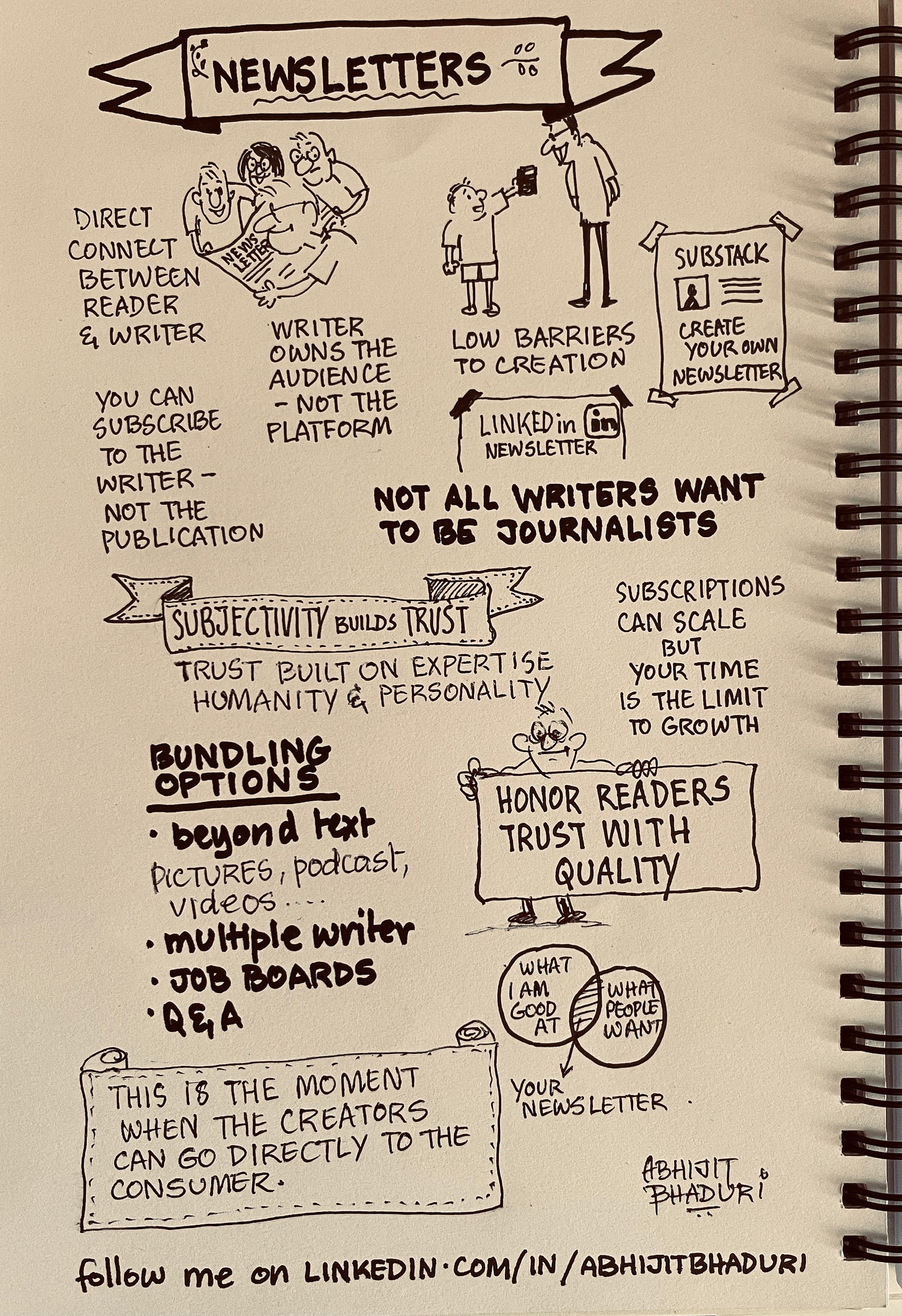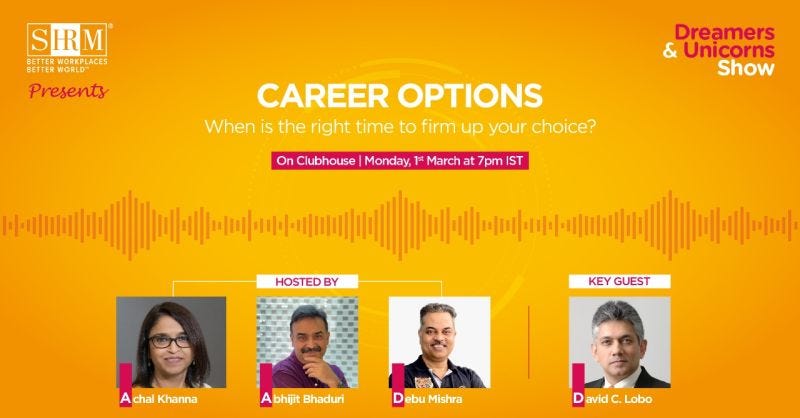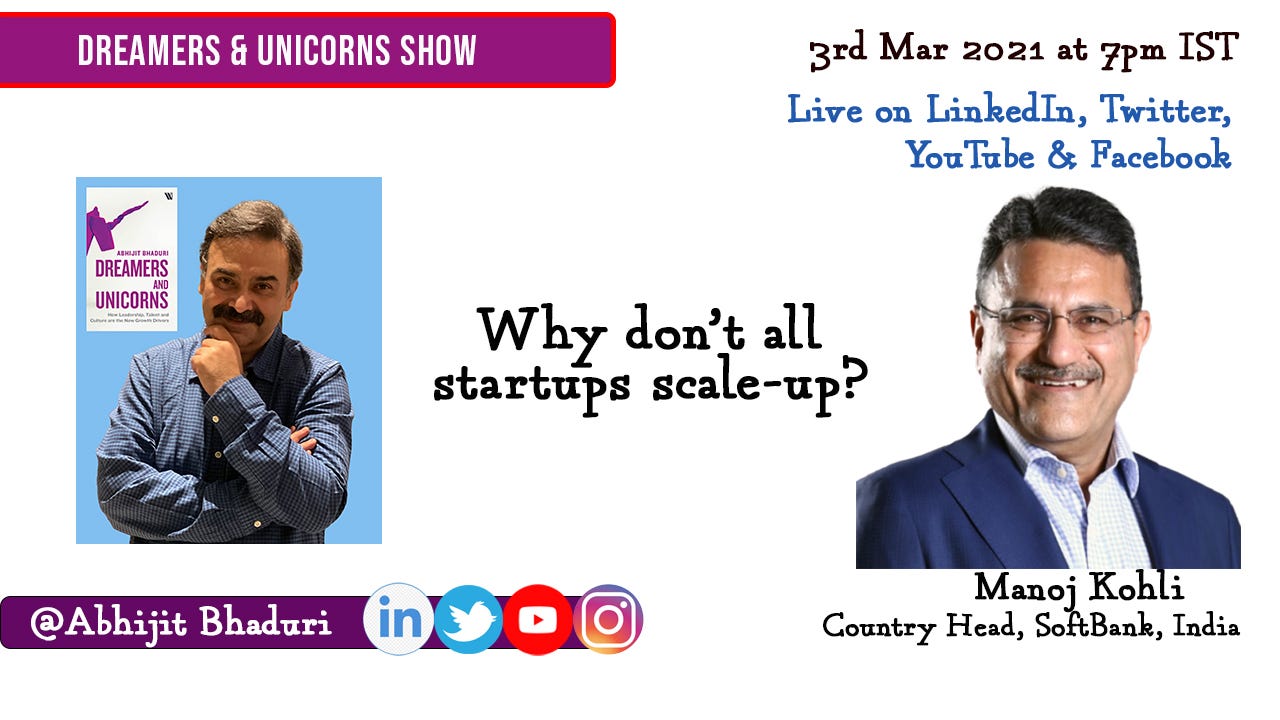Welcome to issue number 40 of my newsletter. This is an opportunity for me to share all the things that made me curious over this week. There are recommendations for podcasts, newsletters, clubhouse chats and books. Plus there is always a plug for stuff I have written that got published. So if you want to subscribe to this newsletter, click and join. Thanks
1. Trends and weak signals
What did you learn this week? That was Estelle Metayer who goes by the twitter handle @Competia. She was hosting a Clubhouse room that had music composer Philip Sheppard - on twitter as @PhilipSheppard (see his website to learn more) and me as the moderators. That question sparked off a storm of ideas in the room.
The magic of dropping audio lies in the serendipity and the random connections that it creates. You'll never know who is going to drop in and listen or be pulled up on stage to ask a question or just share their point of view. It is free flowing like any drawing room conversation among friends. The more diverse the group the greater is the possibility of interesting ideas coming up during a chat. That is just how it was.
The conversation flows like a brook. It bounces, changes course and stabilises before disappearing from sight. The same happened in this room. The credit goes to the diverse group of people who were there. From design futurists to musicians, academics, conference organisers, writers and techies - they were all there.
Here are some snapshots of the conversation. Read my notes
Do you think an audio only app will survive the post pandemic world?
2. Newsletters are having a moment
There was a time when music was bundled and you had to buy a vinyl record or a CD. Then came platforms that let the consumers choose what they listened to. Economies of scale ensured that they could offer unlimited music for a flat monthly fee. Apple Music, Spotify and Amazon Music all have this model.
But there is another moment happening. We are seeing a time when content creators can take their ideas and content directly to the reader or consumer. This is happening not just with the written word but also podcast videos and even music. There are sites like Patreon where artists release their tracks or albums and the fans can get access to their music by paying the artist directly. The site gets a commission and the rest belongs to the artiste.
Writers can upload and publish an e-book directly on Kindle and get bulk of the revenue for themselves every time someone downloads the book. This is especially powerful for first time writers. It is the Direct to Consumer D2C moment for content. Freelancers can be paid directly. A content creator needs only 100 true fans (who pay $100 a month) to be able to live off their craft. This is where the idea is explained
Josh Constine did a Clubhouse chat with some of the writers who make a living off their newsletters. Here are some ideas that I liked. Read the tweets
Here are ideas I sketched out for you.
3. Wobbling is your SUPERPOWER
On my fifth birthday I received a bicycle. I did not know how to ride a cycle. My mother noticed my reluctance to try riding the cycle. I had seen my friends wobble and shake as they tried to balance themselves. I did not want to get hurt or feel like a wobbly fool. "There are training wheels. There is no way you will fall."
Some children in the neighbourhood asked me if they could ride my new cycle. The thought of sharing my new bike with them was unbearable. I refused. After a week of dithering, I mustered up enough courage to give it a shot only to discover that the training wheels were missing from my new cycle. The gangs of my neighbourhood had taken revenge. Without the training wheels I could not ride my cycle. Peace prevailed when I agreed to let them ride the cycle and they in turn would support me as I discovered the superpower called wobbling.
Read more about building this superpower
The foundation of a learning culture is psychological safety — being able to take risks without fear of reprisal. Evidence shows that when teams have psychological safety, they’re more willing to acknowledge their own mistakes and figure out how to prevent them moving forward. They’re also more comfortable raising problems and exploring innovative solutions.
The standard advice for managers on building psychological safety is to model openness and inclusiveness: Ask for feedback on how you can improve, and people will feel it’s safe to take risks.
4. Five skills that you need for future
The world of work is in perpetual beta. Is it even possible to future-proof careers when machines are taking over jobs? Machines need jobs that are rule-based, repetitive and can be done at scale, over and over again millions of times. They are faster, can jump higher and can lift heavier objects than humans. Much like the Olympics motto citius, altius, fortius.
Machines are faster, higher and stronger than humans. Machines are becoming more accurate than radiologists at discovering cancer. But they cannot build hope nor can they empathise with the patient or the family members who are struggling emotionally.
Read why Citius Altius Fortius jobs will go away
I spoke to Ankit Durga about the five skills his startup Skillr is taking to the corporates. What makes this conversation valuable are the tips he shares on HOW to build these soft skills.
DeepFake tech is improving. That worries me
You can use DeepFake technology to animate photos of your relatives - dead or alive. I don’t recommend that you try it and show up on the radar of this group.
On TikTok there’s a handle called @deeptomcruise that showed off this video made with publicly available footage. What if this featured someone doing something they would be embarrassed about? I worry about this.
Join me on 1st March 2021 at 7pm CLUBHOUSE
How old were you when you decided on your career choice?
Did you feel that there were too many interesting options floating around to limit yourself to just one? Or did you have a strong view about what you HATED, but did not know what you liked?
Every Monday at 7pm IST, SHRM hosts a Clubhouse chat that is hosted by Achal Khanna and moderated by Debu Mishra and me.
On Monday 1st March 2021, at 7:00pm IST we have invited David Lobo (he headed HR for several of GE businesses and was also at Amex and Xerox), So join us, raise your hand and jump up on stage to share your experience.
If you are on Apple then download the Clubhouse app, follow me and click this link to join https://www.joinclubhouse.com/event/M5oVndpP
If you can’t join, don’t worry, I will take a few notes and share them with you.
Join me on 3rd March 2021 on LinkedIn
LinkedIn Live with Manoj Kohli
Manoj Kohli is the Country Head – SoftBank India, SoftBank Group International and is supporting over 20 portfolio companies of SoftBank Group and SoftBank Vision Fund such as OLA, OYO, Paytm, Lenskart, Grofers, Snapdeal, WeWork, Delhivery, InMobi, Unacademy, Uber etc in India.
Previously Manoj was also the CEO and Managing Director of Bharti Airtel and his key contribution being building Airtel as no 3 telco in the world from 2m to over 400m customers. He led Bharti Airtel’s India operations for 100x scale-up before moving to International responsibility for 20 countries and was also responsible for leading the Africa operations which Bharti Airtel acquired in June 2010.
His 41 years of work experience is divided between manufacturing, telecom, renewable energy and now digital sectors. Manoj has worked in US, Europe, China, Japan and built businesses in 20 countries in Asia and Africa.
Follow me on LinkedIn.com/in/abhijitbhaduri and you can join in with your questions for Manoj
That is all for this week. See you next Monday at 9:00am
If you like this newsletter, then do tap the heart button below and leave a comment.
Please do share the newsletter with one person this week. Thanks a lot. Bye for now.
email me: abhijitbhaduri@live.com















Thoroughly enjoyed "wobbling is your superpower" and conversation with Ankit Durga.
It reminds me of "T-Shaped Man" https://www.artofmanliness.com/articles/to-succeed-in-work-and-life-be-mr-t
Thanks a lot for the interview!